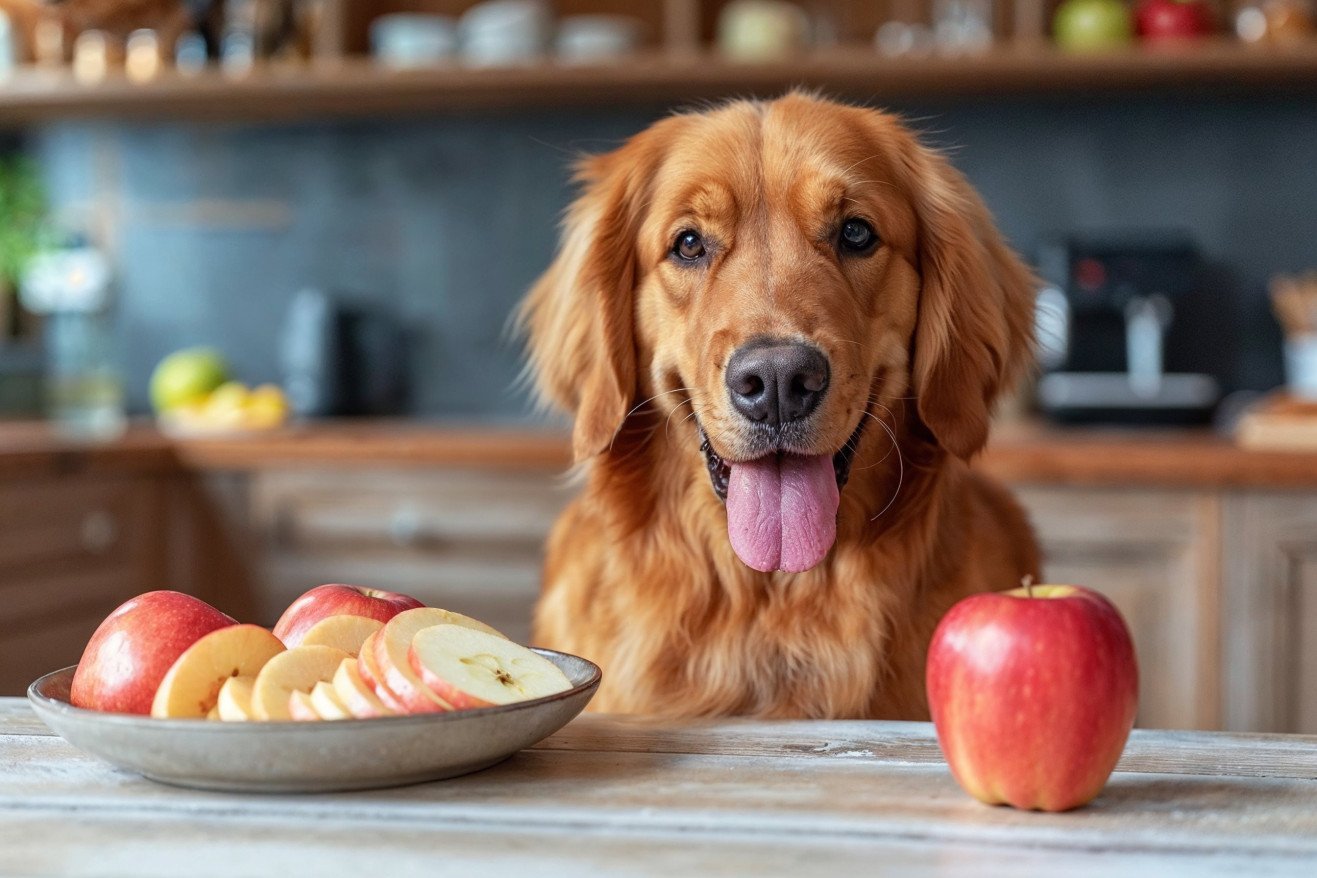Can Dogs Eat Apples? a Guide to Safe Snacking for Your Pooch
23 January 2024 • Updated 28 January 2024

Apples are a popular fruit for people, but are they as appealing to our four-legged friends? The answer is yes, dogs can eat apples, and they can be a healthy snack option when fed in moderation. Apples are a good source of vitamins, fiber, and antioxidants.
However, it’s important to remove the core and seeds, which can be a choking hazard and lead to cyanide poisoning. Apples should be cut into bite-sized pieces and introduced slowly into your dog’s diet.
In this article, we’ll take a closer look at the dos and don’ts of feeding our dogs certain foods, including a number of studies that have been carried out by veterinary nutritionists and other experts in the field of canine health.
These studies have been designed to investigate the nutritional value and potential risks of feeding apples to dogs, the importance of the way apples are prepared, and the impact of apples on dogs’ health overall. By learning about the research behind these recommendations, you’ll be better able to decide whether or not to feed your dog apples.
Can dogs eat apples?
The Garden of Wellness: Apples in Your Dog’s Diet
Apples are a powerhouse of nutrition for dogs. According to The Wildest, apples are packed with important vitamins like A, C, and K, as well as essential minerals like calcium and phosphorus. The soluble fiber pectin in apples can help with blood sugar and digestion, especially for dogs that have diabetes or other gastrointestinal problems. Meanwhile, the insoluble fiber in apples can help with constipation.
Apples also contain antioxidants, including quercetin, that have anti-inflammatory and disease-fighting properties. These antioxidants, as well as the vitamin C in apples, can help boost the immune system and improve a dog’s overall health. Meanwhile, the phytochemicals and flavonoids in apple peels can help protect the heart and lower cholesterol, which is important for dogs and humans alike.
By adding apples to a dog’s diet, pet parents can help ensure their furry friends get these healthful benefits in a low-calorie way that won’t lead to weight gain. However, it’s important to make sure that dogs eat apples in moderation so that they don’t experience any digestive issues and so that they continue to get all the other nutrients they need.
While it’s important to know the benefits of apples for dogs, it’s also important to understand the risks and how to make sure that this fruit is safe for dogs to eat.
Keeping Your Dog Safe and Healthy with Apples: Risks and Precautions
While apples can be a healthy addition to your dog’s diet, there are some precautions you should take to make sure they are a safe treat.
Apple seeds contain cyanogenic glycosides, which can produce cyanide when a dog bites into them, potentially causing cyanide poisoning. While a dog would have to eat a large number of seeds to be affected, according to PetMD, it’s better to be safe than sorry and remove all seeds before giving apples to your dog.
To avoid choking hazards, make sure to remove the core and cut the apple into small, bite-sized pieces that are appropriate for your dog’s size, as recommended by the Blue Cross. This will also help prevent any digestive issues that could arise from a dog eating too much apple at once, including the skin, which is high in fiber.
As with any new food, it’s important to introduce apples to your dog’s diet in moderation. Overeating apples can lead to an upset stomach, which can cause symptoms like diarrhea and vomiting. If your dog experiences these symptoms, contact your vet right away.
Thankfully, apple allergies in dogs are rare, as dogs are usually allergic to proteins and apples are low in protein. However, if you notice any signs of an allergic reaction, such as itching, swelling, or difficulty breathing, take your dog to the vet immediately. By following these precautions, you can help keep your dog healthy and avoid any potential problems, ensuring that apples remain a tasty treat for your dog.
Biting Into Apples: Do They Help Clean Your Dog’s Teeth?
Dental health is important for dogs, and the things they eat can have a big impact on their oral health. Apples may help dogs’ dental health by acting as a natural toothbrush.
As dogs eat the hard flesh of apples, they may be able to scrape off plaque, potentially leading to less tartar and better breath.
That said, it’s important to remember that apples won’t solve all of your dog’s dental problems. While fruits like apples don’t stick to teeth and can help with mechanical cleaning, Grass Valley Vets says they should be used as a supplement to a complete dental care plan.
If you’re using apples to help with your dog’s dental care, make sure you don’t give them any pieces that are too hard and could damage their teeth, and make sure you cut the apple into pieces that are small enough that they won’t be a choking hazard.
While apples can be a part of your dog’s dental care plan, they should be given in moderation and used in conjunction with other dental care methods.
VCA Animal Hospitals says that to make sure your dog’s teeth are as healthy as possible, you should feed them a diet that helps control plaque and make sure they get regular professional dental therapy. In other words, apples can be a fun part of your dog’s dental care plan, but they should be part of a larger plan that will help ensure your dog has a healthy, happy mouth and a beautiful smile.
Apple Slices: a Fun and Healthy Snack for Dogs
In terms of feeding apples to our furry friends, not only is spice the spice of life, but so is variety. Dogs Naturally Magazine explains that raw apples are the only way to go if you want to make sure your dog gets all the vitamins and fiber that can help their digestive system.
However, cooking apples can make them softer and easier for older dogs or dogs with dental problems to eat without worrying about their safety.
If you want to make apple sauce for your dog, just make sure it’s unsweetened and doesn’t have any added spices, both of which can be harmful to dogs. A study published on ResearchGate even offers a unique take on this by adding dried apple pomace. While it may decrease the digestibility of some nutrients, it increases butyrate, a short-chain fatty acid that’s good for the intestines.
When you’re cutting up apples for your dog, it’s best to buy organic apples to avoid pesticides. Also, remember that less is more— a few apple slices or a couple of spoonfuls of apple as an occasional treat is all you need.
Whether you’re giving your dog frozen apple slices on a hot day or a raw apple slice to help with their dental health, apples can be a fun and healthy addition to your dog’s diet as long as you’re careful about how you prepare them.
On the Topic of Apples in Your Dog’s Diet: A Review
In the orchard of dog treats, apples are a healthy option if they are given in the right way. Packed with vitamins, fiber, and antioxidants, apples can help with everything from digestion to the immune system to dental health. That said, it’s important to remember that the seeds and core should be removed to avoid choking and the potential release of cyanide.
As with anything, the key to giving your dog apples is to do so in moderation. Too many apples can lead to an upset stomach, so it’s important to start slow when introducing this new treat. If your dog has dental problems or a sensitive stomach, you may want to opt for a softer form of apple, like cooked apples or unsweetened, unspiced applesauce.
Ultimately, it’s up to you as a pet owner to make informed decisions about what you feed your dog.
Apples can be a fun and nutritious treat for your dog if you prepare and serve them properly.
As we wrap up, it’s important to remember that a healthy, well-rounded diet that’s tailored to your dog’s individual needs and regular visits to the vet are the most important things you can do to keep your dog healthy and happy. Think of adding apples to that well-rounded diet as a way to show your dog how much you love and care for them.


